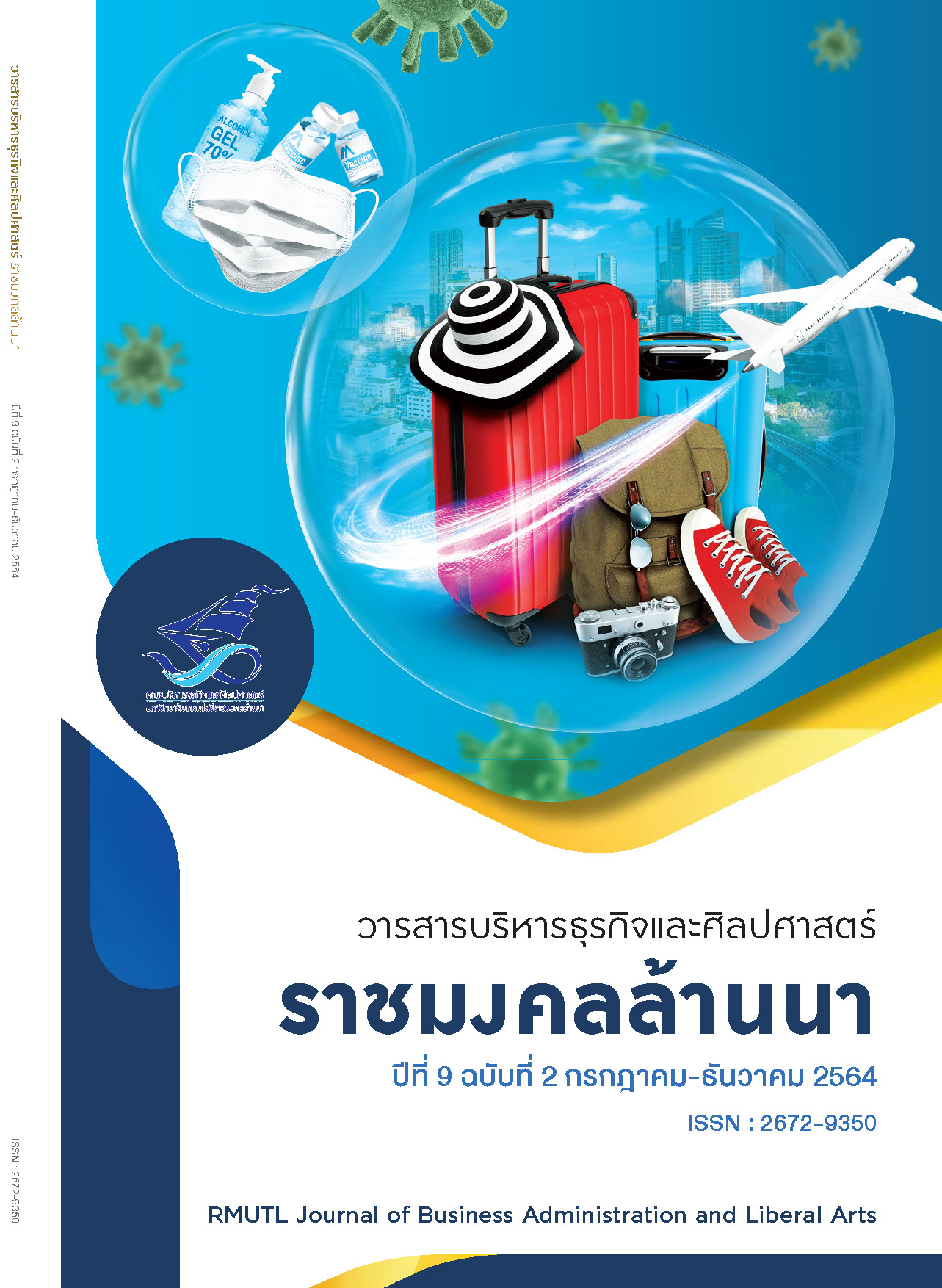Holistic Marketing Strategies That Impact The Performance of Start-Up Businesses in Chiang Mai, Thailand
Main Article Content
Abstract
This research investigates 1) the attitudes towards holistic marketing strategies and their results, 2) the holistic marketing strategies that impact the performance of start-up businesses in Chiang Mai, and 3) the relativity of Structural equation modelling (SEM) for start-up businesses in Chiang Mai. This quantitative research employed statistical technique (SEM) for data analysis. The study sample consisted of 400 start-up businesses in Chiang Mai.
The study found that attitudes towards holistic marketing strategies and their results were at the highest The was also a proof of relativity between structural model and holistic marketing strategies that impact start-up businesses in Chiang Mai with the IOC results being Chi-Square = 79.240, p = 0.081, df = 63, CMIN/df = 1.258, GFI = 0.974, AGFI = 0.951, RMSEA = 0.025 and CFI = 0.993. Moreover, the Structural Equation Modelling (SEM) which the researcher had developed from literature review and relevant concepts and theories significantly confirmed the correlation between holistic marketing strategies variables and the performance of start-up businesses in Chiang Mai. The results showed that internal marketing was the strongest factor in creating direct effect on the performance of start-up businesses in Chiang Mai with the standardized coefficient as of 0.31. Other marketing factors the directly impacted the performance of start-up businesses in Chiang Mai included integrated Marketing, relationship Marketing and social marketing with the standardized coefficient as of 0.30, 0.22, and 0.18 respectively.
Article Details
บทความวิจัยนี้เป็นของลิขสิทธิ์
References
ชัยวัฒน์ ใบไม้. (2560). สตาร์ทอัพ: นิยามความสำคัญ และแนวทางการวิจัย. วารสารนักบริหาร, 37(2), 10-21.
ธีรพงษ์ บุญรักษา, นันทิยา ดวงภุมเมศ และกรญาณ์ เตชะวงศ์เสถียร. (2564). สมรรถนะผู้ประกอบการทางวัฒนธรรมในศตวรรษที่ 21. วารสารบริหารธุรกิจ เศรษฐศาสตร์และการสื่อสาร, 16(1), 143-162.
ธีระวัฒน์ สุขีสาร, ดุษฎี โยเหลา, เสกสรรค์ ทองคำ บรรจง และนิยะดา จิตต์จรัส. (2555). การศึกษาความเที่ยงตรงของการประมาณค่าในการวิเคราะห์โมเดลสมการ โครงสร้างพหุระดับภายใต้เงื่อนไขวิธีการประมาณค่าและขนาดตัวอย่างที่ต่างกัน. วารสารการวัดผลการศึกษา มหาวิทยาลัยมหาสารคาม, 17(1), 95-106.
นุจรี เตชะสุกิจ. (2557). ประสิทธิภาพการสื่อสารทางการตลาดที่มีอิทธิพลต่อพฤติกรรมการตัดสินใจซื้อน้ำหอมต่างประเทศ.(ค้นคว้าอิสระปริญญาบริหารธุรกิจมหาบัณฑิต). กรุงเทพฯ: มหาวิทยาลัยกรุงเทพ
ประวิตร์ สายแก้ว, จินดารัตน์ ปีมณี และเกสินี หมื่นไธสง. (2552). ความสัมพันธ์ระหว่างกลยุทธ์การตลาดภายในกับผลการดำเนินงานของธุรกิจขนาดกลางและขนาดย่อมประเภทโรงแรมในประเทศไทย. จุฬาลงกรณ์ธุรกิจปริทัศน์, 31(119-120), 109-122.
พจน์ สะเพียรชัย. (2546). ผู้บริหารสถานศึกษากับการวิจัยเพื่อสร้างองค์กรแห่งการเรียนรู้. กรุงเทพมหานคร: สำนักนโยบายและแผนแห่งการศึกษา สำนักงานคณะกรรมการการศึกษาแห่งชาติ.
พักตร์ศุภางค์ ศรีสวัสดิ์. (2554). ความสัมพันธ์ระหว่างความรับผิดชอบต่อสังคม (CSR) กับภาพลักษณ์องค์กรของเครือซิเมนต์ไทย (SCG) ในมุมมองของผู้บริโภคในเขตกรุงเทพมหานคร.(การค้นคว้าอิสระบริหารธุรกิจมหาบัณฑิต), ปทุมธานี: มหาวิทยาลัยเทคโนโลยีราชมงคลธัญบุรี.
ราณี อมรินทร์รัตน์. (2560). ปัจจัยความสำเร็จของการตลาดเชิงสัมพันธ์ในอุตสาหกรรมการท่องเที่ยว. วารสารวิจัยและพัฒนา วไลยอลงกรณ์ ในพระบรมราชูปถัมภ์, 12(1), 1-8.
ศศิรินทร์ สายะสนธิ. (2560). ทำไม Startup ในไทยถึงไม่ค่อยประสบความสำเร็จ?. สืบค้น 18 สิงหาคม 2560, จาก https://www.bangkokbiznews.com/news/760159
สมหวัง พิธิยานุวัฒน์. (2544). วิธีวิทยาการประเมิน: ศาสตร์แห่งคุณค่า. กรุงเทพฯ: สำนักพิมพ์ แห่งจุฬาลงกรมหาวิทยาลัย.
สำนักงานข้อมูลข่าวสารของราชการ (สขร.). (2559). รายงานสถานการณ์วิสาหกิจขนาดกลางและขนาดย่อม ปี 2559. สืบค้น 2 ธันวาคม 2559 จากhttp://www.oic.go.th/FILEWEB/CABINFOCENTER2/DRAWER039/GENERAL/DATA0000/00000429.PDF
สำนักงานคณะกรรมการพัฒนาการเศรษฐกิจและสังคมแห่งชาติ. (2559). รายงานการประชุมคณะกรรมการนโยบายเศรษฐกิจสร้างสรรค์แห่งชาติ (กศส.). คณะกรรมการนโยบายเศรษฐกิจสร้างสรรค์แห่งชาติ (กศส.) สืบค้น 2 ธันวาคม 2559, จาก http://www.nesdb.go.th/morenews.php?cid=232&filename=index
สำนักงานนวัตกรรมแห่งชาติ (องค์การมหาชน) สำนักงานภาคเหนือ. (2563). 9 ประเภทธุรกิจ Startup มีอะไรบ้างมาทำความรู้จักกันเถอะ!!. สืบค้น 1 ธันวาคม 2563, จาก https://www.facebook.com/118479366725999/posts/141467717760497/
สำนักงานปลัดกระทรวงพาณิชย์. (2560). แผนยุทธ์ศาสตร์กลุ่มการค้าจังหวัดภาคเหนือ 1 พ.ศ. 2560-2564. สืบค้น 15 ธันวาคม 2560, จาก http://www.ops.moc.go.th/ewt_dl_link.php?nid=3580.
สุวิทย์ เมษินทรีย์. (2559). แนวคิดเกี่ยวกับประเทศไทย 4.0. สืบค้น 1 สิงหาคม 2560 จาก https://planning2.mju.ac.th/goverment/20111119104835_planning/Doc_25590823143652_358135.pdf
Blank, S. and B. Dorf. (2012). The Start-up Owner's Manual : The Step-by-Step Guide for Building a Great Company, Pescadero. CA: K&S Ranch.
BLT Bangkok. (2019). จับตาสตาร์ทอัพไทยก้าวสู่ยูนิคอร์นภายใน 5 ปี. สืบค้น 1 สิงหาคม 2563, จาก https://www.bltbangkok.com/news/4756/
Fayolle Alain and Francisco Liñán. (2014). The Future of Research on Entrepreneurial Intentions. Journal of Business Research, 67(5), 663-666.
Hair, J., et al. (2010). Multivariate data analysis (7th de.). Upper Saddle River, New Jersey: Pearson Education International.
Kotler, P., & Keller, K.L. (2012). Marketing management. 14th Ed. Upper Saddle River, New Jersey: Pearson Education.
ปริวรรต วงษ์สำราญ. (2018). ยักษ์ธุรกิจอัด 3.5 หมื่นล้าน ปั้นสตาร์ตอัพ!. สืบค้น 1 สิงหคม 2561, จาก https://www.terrabkk.com/news/193063

